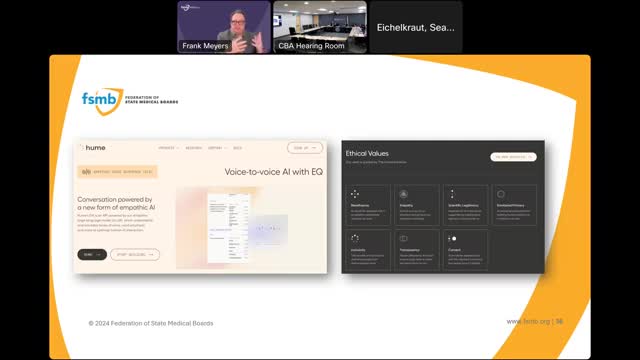AI Revolutionizes Healthcare Decision Making and Patient Interaction
August 23, 2024 | Medical Board of California, Other State Agencies, Executive, California
This article was created by AI summarizing key points discussed. AI makes mistakes, so for full details and context, please refer to the video of the full meeting. Please report any errors so we can fix them. Report an error »

During a recent government meeting, discussions centered on the implications of artificial intelligence (AI) in healthcare, particularly regarding its regulatory challenges and potential benefits. A key concern raised was the extent to which AI models, which can assess patient well-being, might encroach upon the practice of medicine. The dialogue highlighted the need for careful consideration of the decision-making processes involved when AI indicates a patient may be unwell, especially in emotional contexts.
The meeting showcased various AI tools designed for medical applications, including Nucleo AI, which assists pathologists in creating diverse datasets for clinical use, and Path Chat, a chatbot that facilitates discussions about pathology images. These advancements were noted as promising developments that could significantly transform healthcare delivery.
Additionally, the conversation touched on the use of AI in medical boards for complaint intake. A proposed AI tool aims to streamline the process by triaging complaints, identifying priorities, and suggesting follow-up actions. While the AI demonstrated proficiency in summarizing complaints and identifying relevant parties, it struggled with pinpointing applicable statutes, indicating a need for further refinement.
The District of Columbia's implementation of an AI virtual agent was also mentioned, which serves as a resource for the public to obtain information about health department staff and services. Overall, the meeting underscored the potential of AI to enhance healthcare outcomes, while also emphasizing the importance of regulatory oversight and the need for ongoing evaluation of these technologies.
The meeting showcased various AI tools designed for medical applications, including Nucleo AI, which assists pathologists in creating diverse datasets for clinical use, and Path Chat, a chatbot that facilitates discussions about pathology images. These advancements were noted as promising developments that could significantly transform healthcare delivery.
Additionally, the conversation touched on the use of AI in medical boards for complaint intake. A proposed AI tool aims to streamline the process by triaging complaints, identifying priorities, and suggesting follow-up actions. While the AI demonstrated proficiency in summarizing complaints and identifying relevant parties, it struggled with pinpointing applicable statutes, indicating a need for further refinement.
The District of Columbia's implementation of an AI virtual agent was also mentioned, which serves as a resource for the public to obtain information about health department staff and services. Overall, the meeting underscored the potential of AI to enhance healthcare outcomes, while also emphasizing the importance of regulatory oversight and the need for ongoing evaluation of these technologies.
View full meeting
This article is based on a recent meeting—watch the full video and explore the complete transcript for deeper insights into the discussion.
View full meeting
